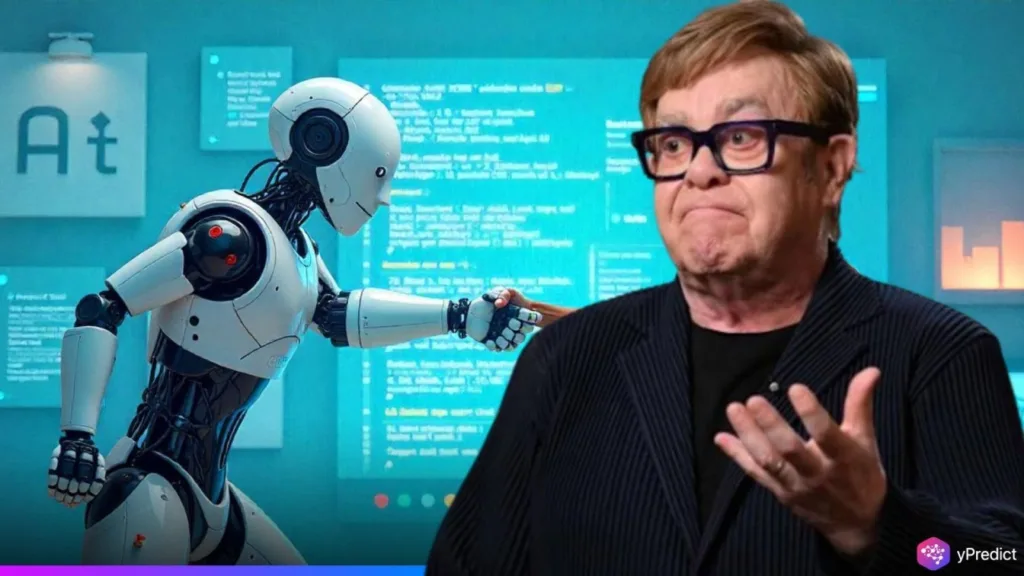
British music legend Sir Elton John harshly criticised the UK government’s proposed AI copyright law during a live BBC interview. He accused politicians of betraying the creative community and angrily referred to them as “absolute losers” for their actions. He condemned the plan allowing AI developers to use copyrighted content without permission, calling it dangerous and irresponsible legislation. John warned that this move seriously threatens young and emerging artists struggling to protect their work in the digital age.
John’s remarks, backed by hundreds of industry professionals, come amid rising concern that the UK’s Data Bill prioritises technological innovation over artistic rights, sparking a national discussion on copyright, creativity, and AI ethics.
Concerns Over AI’s Impact on Creative Rights
In a candid BBC interview, John sharply criticised the UK government’s AI copyright plans for enabling exploitation of creative work. He accused the government of letting tech corporations use protected content without permission or compensation, calling it a serious betrayal. John argued that allowing AI developers to use copyrighted material freely amounts to “large-scale theft” of artists’ intellectual and creative labour. He warned that this policy could severely harm emerging artists who lack financial strength and legal support to fight powerful tech companies.
The legendary singer-songwriter expressed significant disapproval, calling the government’s handling of the problem reckless and disrespectful, and adding he felt “incredibly betrayed.” He cautioned that the proposed legal system would deprive future generations of artists of both their intellectual property and potential earnings. He said,
It’s criminal, in that I feel incredibly betrayed: the House of Lords did a vote, and it was more than two to one in our favour, the government just looked at it as if to say: ‘Hmmm, well the old people … like me can afford it.
Sir John directed his outrage at the Labour government for rejecting House of Lords amendments to the Data Bill. These amendments required AI companies to get explicit permission from rights holders before using their work in training models. They also demanded transparency from developers about the sources and details of any content used in AI systems. The government dismissed these provisions as premature, citing an ongoing consultation and warning against fragmenting the legislative process too early.
Moreover, John labelled Cabinet members as “absolute losers” and singled out Technology Secretary Peter Kyle, labelling him “a bit of a moron” for supposedly failing to stand up to the power of huge internet giants. According to reports, talks between Kyle’s department and corporate titans such as Google, Meta, Amazon, and Apple have increased significantly since the Labour Party gained administration, causing fears about regulatory control.
The Future of Creative Work
The backlash comes amid growing demand for greater transparency in AI development, with hundreds of media and creative companies, including The Telegraph, calling for stronger monitoring. Prominent musicians, including Dame Shirley Bassey and Robbie Williams, have expressed concern that without mandatory transparency, creative work is effectively hijacked without recognition or accountability.
The music and creative industries in the United Kingdom generate more than £100 billion in revenue and employ more than two million people. Elton John and other musicians worry that relaxing copyright laws in favour of big tech will undercut the incentives that drive unique artistic creativity.
Over 400 artists, including Paul McCartney, Dua Lipa, and Ian McKellen, signed a letter urging Prime Minister Starmer to improve copyright laws against AI exploitation. The letter cautions that failure to address these concerns may harm the UK’s creative industry and its worldwide cultural stature.
Conclusion
As the UK government pushes ahead with controversial AI copyright legislation, John’s vocal criticism illustrates the vast difference between technological advancement and the protection of creative rights. The stakes go far beyond politics, affecting the future of artistic innovation and economic viability in Britain’s cultural sector. With considerable resistance from artists and industry leaders, the government is under increasing pressure to reassess its strategy.






